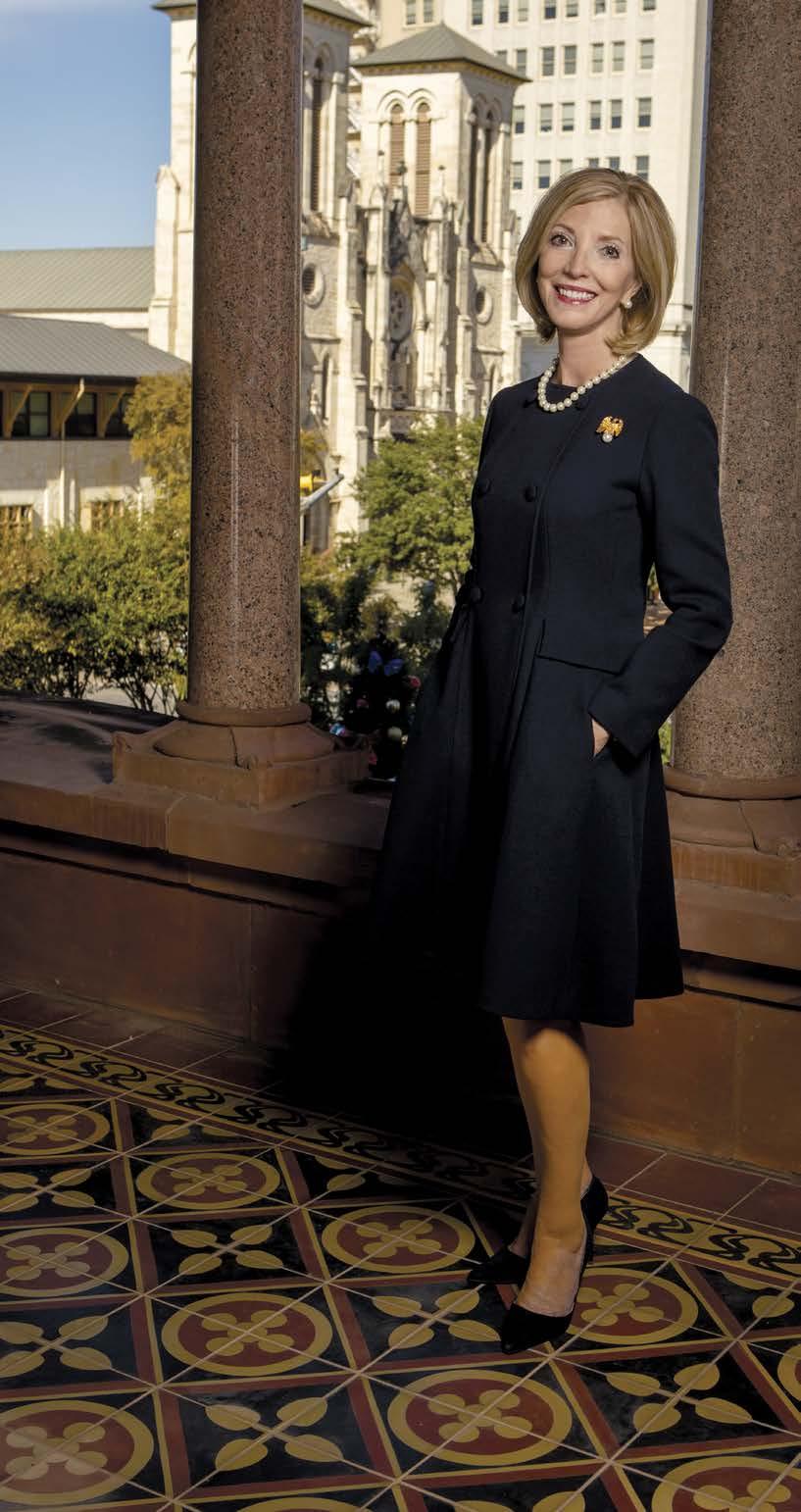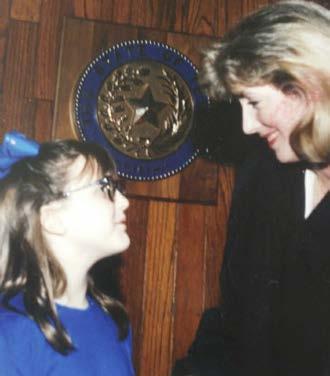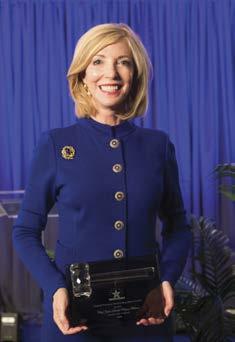
14 minute read
Texas Bar Foundation Honors Chief Justice Sandee Bryan Marion
By Sara Dysart
The Texas Bar Foundation honored then-Fourth Court Chief Justice Sandee Bryan Marion with the 2020 Samuel Pessara Outstanding Jurist Award. With the cancellation of the Texas Bar Foundation Dinner in June, Stephen Benesh, Chair of the Fellows, and Andrea Stone, Executive Director, presented this award to Chief Justice Marion at the Texas Center for the Judiciary Annual Conference on Texas Bar Foundation Day in September 2020. Chief Justice Marion’s acceptance remarks are reflective of the traits that made her so deserving of this award. Included in her comments was a message she received from District Judge Larry Noll at her swearing-in ceremony as an appellate judge—“Always remember that the practice of law is hard for most lawyers.” Attorneys, staff, and law students who crossed paths with Chief Justice Marion were always treated in a manner that made the practice of law a little less hard that day.
Bexar County attorneys know Sandee Bryan Marion as practitioner, Probate Judge, Justice, and Chief Justice. Whether you worked with or opposite Sandee Marion as a practitioner or appeared before her in court, you have your own version of her professionalism and empathy. Chief Justice and Mayor Phil Hardberger, Chief Justice Catherine Stone, Probate Judge Polly Jackson Spencer, and Justice Beth Watkins share their experiences of Chief Justice Marion’s professionalism and empathy.
A Reliable Antidote to Every Lawyer Joke Ever Told
Chief Justice Phil Hardberger knew then-Judge Marion in the community and was aware of her excellent reputation as a Probate Judge when she was appointed to the Fourth Court of Appeals, where he served as Chief Justice. He immediately recognized Justice Marion as being fair-minded, pleasant, skilled in the law, and hard-working: “Justice Marion went immediately to work. She spent a minimum amount of time in socializing, and a maximum amount of time in working. When she walked into her chambers, it was all work.” He remembered on more than one occasion “walking by her chambers in the dwindling light of a dying day, the Court . . . quiet with the departure of the judges, lawyers, and clerks, and seeing her surrounded by law books, cases, and statements of fact.”
Justice Marion’s hard work is reflected in opinions in which she “extends dignity and empathy to every lawyer or litigant who comes before her. She is kind, not sarcastic; accommodating, not imperialistic. She makes sense of the weakest argument and rewards the strongest.” Perhaps indicative of Judge Noll’s reminder about the difficulty of practicing law, “she does not scold a lawyer in front of his or her client; but treats them as equal servants of the law, which is high enough of a calling.” “The years have gone by,” Chief Justice Hardberger continued, “but Justice Marion has kept and nourished those many qualities that made her an outstanding jurist and a model Chief Justice. Her inner light, an unquenchable search for truth, and her willingness to put in a long day for the sake of justice are a reliable antidote to every lawyer joke ever told.”
The Efficient Work of the Court Continued
Chief Justice Stone recalled that under thenJudge Marion and Judge Polly Jackson Spencer “the Bexar County Probate Courts became a model of efficiency and compassionate service to the public.” Like Hardberger, Stone noted that “Justice Marion joined the Fourth Court of Appeals and hit the ground running with oral arguments and well-written opinions. She was always current with her docket.” After Stone retired from the Court in 2014, Justice Marion succeeded her as Chief Justice. Because “she was always so active in furthering the Court’s service,” Stone recalled,”the transition was seamless, and the efficient work of the Court continued.” Chief Justice Stone also commended Chief Justice Marion’s service to the community and to the judiciary. “In 2017 she was elected as the Chair of the Council of Chief Justices and led the appellate judges through the demanding task of presenting the appellate courts’ needs to the legislature. She also somehow found the time to serve on the Supreme Court Task Force addressing child protection rules.” Chief Justice Marion’s dedication to public service was on full display in one of her last additional assignments, in which she “answered Chief Justice Hecht’s call for assistance and served as the trial judge in a very high-profile case in Tarrant County involving the continuation of life support for a terminally ill young child. Her willingness to take on such an intellectually and emotionally demanding case is the mark of this fine jurist.”

Chief Justice Sandee Bryan Marion
photo by Natalee Marion.
Judicial Opponents Became Friends
Judge Polly Jackson Spencer has a special friendship with Sandee Marion. They became friends during the 1990 election cycle when they ran against each other. Their race was lauded for the decent and gracious way it was conducted. Judge Spencer won in 1990, and Marion was elected in 1992 to serve as the judge of the other Bexar County Probate Court. The two judges became colleagues, and their friendship flourished. Judge Spencer introduced Justice Marion in 2008 when she was honored as the St. Mary’s University School of Law Distinguished Law Graduate. Justice Marion repaid the favor when Judge Spencer received the same honor in 2010.
Judge Spencer noted Justice Marion’s role as Chair of the Council of Chief Justices: “While this is quite an honor, it is also quite a bit of work, a mantle which she humbly accepted and a task which she diligently fulfilled to the end of her term as such.” Judge Spencer also commented on Chief Justice Marion’s legal expertise: While she “never shares specifics about cases she is working on, she will often tell me about reading the law and sometimes agonizing over decisions she must make.” Judge Spencer echoed the impact of Chief Justice Marion’s diligence and her thoughtful opinions: “We have served on committees together such as the Pattern Jury Charge committee, and I and others have pointed to opinions she has written which have clarified or presented the law in ways that have advanced practitioners’ understanding of various subtle points of law.”
Just Put on Your Heels and Go To Work
Having known Sandee Marion as a law student, briefing attorney, practitioner, and colleague, Justice Beth Watkins has a unique perspective of Chief Justice Marion. When Justice Watkins was a law student, Marion was a Probate Judge with a school-aged daughter, Natalee. “Despite the demands on [her] time, law students always knew they could count on Judge Marion—whether to make a daytime presentation to a group on campus about her experience on the bench or to judge an advocacy competition in the evening,” Watkins recalled. “Law students find her so approachable that, after bar exam results come out, there’s always a line of newly minted lawyers waiting for her to swear them in. With grace, good humor, and patience, she modeled to law students the very best of what the judiciary could be.”
After graduation from law school Watkins served as a briefing attorney for Justice Catherine Stone. Justice Marion had joined the court a few months prior. Watkins reminisced about the shared suite that made up the chambers of Justice Stone and Justice Marion, with their respective briefing attorneys “stationed in small cubicles just outside their doors.” From that vantage point, Watkins “had a front-row seat as Justice Marion brought the lessons she learned as a probate judge to the Court of Appeals. She was the same patient, kind, and generous jurist.” Justice Watkins described Justice Marion’s approach as “earnest,” noting that Justice Marion never pre-judged “a case, a party, or an issue within a case.”
—Natalee B. Marion, Associate Counsel, The University of Texas at San Antonio

Judge Sandee Bryan Marion graduating from St. Mary’s University School of Law.
photo courtesy of Chief Justice Sandee Bryan Marion

Judge Marion with her daughter Natalee Marion, upon the occasion of her installation as Judge of Bexar County Probate Court No. 2 in 1992.
photo courtesy of Chief Justice Sandee Bryan Marion

Natalee Marion with her mother on the occasion of her installation as Chief Justice of the Fourth Court of Appeals in 2014.
photo courtesy of Chief Justice Sandee Bryan Marion

Chief Justice Marion with her daughter, Natalee Marion.
photo courtesy of Chief Justice Sandee Bryan Marion

Fourth Court of Appeals as of December 2020.
photo courtesy of Chief Justice Sandee Bryan Marion
Sandee Bryan Marion graduated from the University of Texas at Austin with honors and received her law degree from St. Mary’s University School of Law. She entered private practice in 1980, obtained Board Certification in Family Law in 1988, and was elected to Bexar County Probate Court Number 2 in 1992. In 2002, she was appointed to the Fourth Court of Appeals. Following two elections to the appellate bench, she was elected Chief Justice in 2014. In 2017, her fellow chief justices honored her by naming her Chief of the Council of Chief Justices of the State of Texas. Chief Justice Marion retired from the appellate bench on December 31, 2020, to pursue many more meaningful chapters of her legal career.

Chief Justice Marion received the 2020 Samuel Pessarra Outstanding Jurist Award.
photo courtesy of Chief Justice Sandee Bryan Marion
In 1987, the Texas Bar Foundation created the Outstanding Jurist Award to honor an active Federal or State Judge who exhibits an exceptional reputation for competency, efficiency, and integrity. In 1995, the estate of Mrs. Samuel Pessarra funded an endowment for the Outstanding Jurist Award in honor of her late husband. The award was renamed the Samuel Pessarra Outstanding Jurist Award in 1995. As the recipient of this award, Chief Justice Marion designated St. Mary’s University School of Law to receive a $1,000 scholarship donation from the Texas Bar Foundation.

Chief Justice Marion with Judge Polly Jackson Spencer.
photo courtesy of Chief Justice Sandee Bryan Marion
Justice Marion was curious, and questioned “every angle of an opinion, its result, and how it would impact future litigants.” Yet she never lost sight of the fact that real people were affected by the court’s opinions. Justice Watkins remembered watching Justice Marion “agonize over cases where a party’s rights had been lost by a lawyer’s failure to object or to properly raise an argument.” Justice Marion was also cognizant of the impact that the jurists had on younger lawyers. “Time after time, she would discuss cases at length with briefing attorneys,” Justice Watkins continued, “recent law graduates like me who certainly added no value to her decisionmaking process—to help the next generation of lawyers understand the effect of the opinion.”
Echoing the sentiments of Marion’s other colleagues, Watkins commended Chief Justice Marion’s indefatigable work ethic. Justice Watkins observed that Justice Marion “took her preparation extraordinarily seriously, to the point where she was prepared not only on cases that had been assigned to her to author, and cases where she was on the panel, but also on all the other cases on the Court’s docket.” On one occasion, at the very last minute, another justice was unable to attend a complicated 9:00 a.m. oral argument. Justice Marion was already at the courthouse and was able to step in so that the argument could proceed. Justice Watkins noted that Justice Marion “didn’t make a big deal of it. As I have heard her say many times since then, you just put on your heels and go to work.”
Watkins recalls appearing as a practicing appellate attorney before Justice Marion: “As an appellate advocate, I came to realize how break-the-mold unique she is. During oral argument, some justices on this Court would immediately begin intense questioning, inundating the advocate before she even had a chance to settle her nerves. Not Justice Marion. She recognized how precious the twenty minutes of a party’s time before the Court are, and for years, I watched her masterfully ensure that each advocate has an opportunity to make her critical arguments. If one justice interrupts an argument with a question, Justice Marion is always there to guide the advocate back to that line of argument. What’s truly remarkable is how genuine she is—she phrases her questions and comments so thoughtfully that you feel like you might be the best advocate to ever stand at the Fourth Court’s podium. And everyone in the courtroom feels that, regardless of the outcome. When I lost a case with Justice Marion on the panel, I knew the Court had fully considered all aspects of the issue, and even if I didn’t like the result, I trusted that the Court reached the right result. Her presence on the Court elevate[d] its decision-making process, the quality of its opinions, and the jurisprudence of the State.”
When Justice Watkins joined the Fourth Court of Appeals, Chief Justice Marion welcomed her back to the Court with open arms and graciously brought her up to speed. “Chief Justice Marion was on the panel for my first oral argument behind the bench, and I confessed to her that I was more than a little nervous. She admitted that even after eighteen years on the appellate bench, she still gets nervous before each oral argument.” True to form, Chief Justice Marion’s nerves are inspired by her reverence for the tremendous power that the judiciary wields. “She knows what is at stake for the parties, and she wants to provide a thoughtful dialog and ensure that they have the best experience possible.”
More Than a Legal Scholar and Jurist
Chief Justice Marion is much more than a legal scholar and jurist. She is a community leader and supporter. Chief Justice Marion “believes in hard work and trying to get it right,” Judge Polly Jackson Spencer recalled, but she also “believes in giving back to the community. She is interested in and cares about other people. She visits when they are ill. She cheers their accomplishments and grieves with them over their losses.” Chief Justice Marion’s dedication to community service has been recognized by many organizations. Judge Spencer enumerated some of those accolades and accomplishments, including Marion’s election as the first female president of the Rotary Club of San Antonio, one of the largest Rotary clubs in the world; her recognition as the Distinguished Law Alumna of St. Mary’s Law School; and her service as president of the Law Alumni Association. Additionally, Chief Justice Marion was elected to the San Antonio Women’s Hall of Fame and has been honored as Woman of the Year by many organizations.
Judge Spencer shared some other interesting peeks into the life of Sandee Bryan Marion. She was a varsity cheerleader, a most coveted position, according to Spencer—I fully concur! Another enduring claim to fame was performing for San Antonio’s Queen of Fiesta as a young girl. Chief Justice Marion is fluent in Spanish, having earned an undergraduate degree from UT in Spanish, participating in a Spanish immersion program sponsored by Rice University, and studying Spanish in Mexico. She also appeared on the KENS 5 TV 6 a.m. news for six years as legal advisor, while practicing law as a partner with Sawtelle, Goode, Davidson, & Troilo and raising her daughter, Natalee.
Abundant Professionalism and Empathy
I have known Chief Justice Marion since we were students at St. Mary’s University School of Law. To this day, I can see her working with another classmate, Frank Ruttenberg, as they held leadership positions in the Student Bar Association. As president of the SBA, Sandee Marion was a recognized leader in law school.
Chief Justice Marion’s commitment to others is exemplified by her participation and support of community activities. She attends many community events; often purchasing a single ticket and joining others who support the many causes which she supports. Think of the impact when someone chats with this warm, gracious woman and realizes that he or she is visiting with the Chief Justice of the Fourth Court of Appeals (now retired Chief Justice). I am sure most individuals realize Chief Justice Marion’s judicial position long after their meeting because she will spend her time asking about them and their families and interests.
When I think about and recommend role models for women attorneys, Chief Justice Marion is number one on my list.
Many More Meaningful Chapters Ahead
The people of Texas, especially Bexar County and the Fourth Judicial District, have benefitted beyond measure from Sandee Bryan Marion’s service and the truly outstanding jurist she has been. Stay tuned—many more meaningful chapters of her legal career remain to be revealed!

Sara Dysart is a commercial real estate attorney and is a candidate for 2021 State Bar of Texas President-Elect.








